Geology of the Grand Canyon area
The geology of the Grand Canyon area includes one of the most complete and studied sequences of
Uplift of the region started about 75 million years ago during the
Wetter
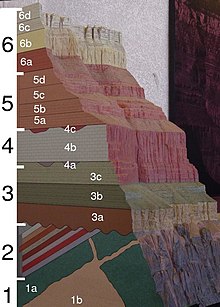
Deposition of sediments

Vishnu Basement Rocks
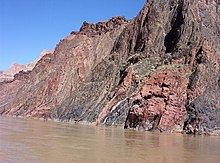
At about 2.5 and 1.8 billion years ago in
As the volcanic islands collided with the mainland around 1.7 billion years ago, blobs of
Subsequent erosion lasting 300 million years stripped much of the exposed sediments and the mountains away.
Grand Canyon Supergroup
In late Precambrian time, extension from a large
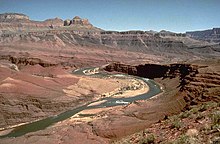
The oldest section of the supergroup is the
Nankoweap Formation is around 1050 million years old and is not part of a group.[17] This rock unit is made of coarse-grained sandstone, and was deposited in a shallow sea on top of the eroded surface of the Cardenas Basalt.[9] The Nankoweap is only exposed in the eastern part of the canyon. A gap in the geologic record, an unconformity, follows the Nankoweap.
All formations in the Chuar Group were deposited in coastal and shallow sea environments about 1000 to 700 million years ago.[18] The Galeros Formation is a mainly greenish formation composed of interbedded sandstone, limestone, and shale. Fossilized stromatolites are found in the Galeros.[19] The Kwagunt Formation consists of black shale and red to purple mudstone with some limestone.[20] Isolated pockets of reddish sandstone are also found around Carbon Butte. Stromatolites are found in this layer.
About 800 million years ago the supergroup was tilted 15° and block
Tonto Group

During the

Tapeats Sandstone averages 525 million years old and is made of medium- to coarse-grained sand and conglomerate that was deposited on an ancient shore (see 3a in figure 1).[10] Ripple marks are common in the upper members of this dark brown thin-bedded layer. Fossils and imprint trails of trilobites and brachiopods have also been found in the Tapeats. Today it is a cliff-former that is 100 to 325 feet (30 to 100 m) thick.[28] Bright Angel Shale averages 515 million years old and is made of mudstone-derived shale that is interbedded with small sections of sandstone and shaly limestone with a few thin beds of dolomite.[10] It was mostly deposited as mud just offshore and contains brachiopod, trilobite, and worm fossils (see 3b in figure 1). The color of this formation is mostly various shades of green with some brownish-tan to gray parts. It is a slope-former and is 270 to 450 feet (82 to 137 m) thick.[29] Glauconite is responsible for the green coloration of the Bright Angel.[30] Muav Limestone averages 505 million years old and is made of gray, thin-bedded limestone that was deposited farther offshore from calcium carbonate precipitates (see 3c in figure 1).[10] The western part of the canyon has a much thicker sequence of Muav than the eastern part.[31] The Muav is a cliff-former, 136 to 827 feet (41 to 252 m) thick.[32]
These three formations were laid down over a period of 30 million years from early-to-middle Cambrian time.
Temple Butte, Redwall, and Surprise Canyon
The next two periods of

Geologists do know that deep channels were carved on the top of the Muav Limestone during this time.[33][34] Streams were the likely cause, but marine scour may be to blame. Either way, these depressions were filled with freshwater limestone about 385 million years ago in the Middle Devonian in a formation that geologists call the Temple Butte Formation (see 4a in figure 1).[10] Marble Canyon in the eastern part of the park displays these filled purplish-colored channels well.[33] Temple Butte Formation is a cliff-former in the western part of the park where it is gray to cream-colored dolomite. Fossils of animals with backbones are found in this formation; bony plates from freshwater fish in the eastern part and numerous marine fish fossils in the western part. Temple Butte Formation is 100 to 450 feet (30 to 137 m) thick; thinner near Grand Canyon Village and thicker in western Grand Canyon.[35] An unconformity representing 40 to 50 million years of lost geologic history marks the top of this formation.[36]
The next formation in the Grand Canyon geologic column is the cliff-forming
Surprise Canyon Formation is a sedimentary layer of purplish-red shale that was laid down in discontinuous beds of sand and lime above the Redwall (see 4c in figure 1). It was created in very late Mississippian and possibly in very earliest Pennsylvanian time as the land subsided and tidal estuaries filled river valleys with sediment.[33] This formation only exists in isolated lenses that are 50 to 400 feet (15 to 122 m) thick.[39] Surprise Canyon was unknown to science until 1973 and can be reached only by helicopter.[38] Fossil logs, other plant material and marine shells are found in this formation.[33] An unconformity marks the top of the Surprise Canyon Formation and in most places this unconformity has entirely removed the Surprise Canyon and exposed the underlying Redwall.
Supai Group

An unconformity of 15 to 20 million years separates the
Supai Group formations in the western part of the canyon contain limestone, indicative of a warm, shallow sea, while the eastern part was probably a muddy river delta. This formation consists of red siltstones and shale capped by tan-colored sandstone beds that together reach a thickness of 600 to 700 ft (around 200 m).
Formations of the Supai Group are from oldest to youngest (an unconformity is present at the top of each): Watahomigi (see 5a in figure 1) is a slope-forming gray limestone with some red chert bands, sandstone, and purple siltstone that is 100 to 300 feet (30 to 90 m) thick.[43] Manakacha (see 5b in figure 1) is a cliff- and slope-forming pale red sandstone and red shale that averages 300 feet (90 m) thick in Grand Canyon.[44] Wescogame (see 5c in figure 1) is a ledge- and slope-forming pale red sandstone and siltstone that is 100 to 200 feet (30 to 60 m) thick.[45] Esplanade (see 5d in figure 1) is a ledge- and cliff-forming pale red sandstone and siltstone that is 200 to 800 feet (60 to 200 m) thick.[46] An unconformity marks the top of the Supai Group.
Hermit, Coconino, Toroweap, and Kaibab
Like the Supai Group below it, the Permian-aged Hermit Formation was probably deposited on a broad coastal plain (see 6a in figure 1).[40] The alternating thin-bedded iron oxide, mud and silt were deposited via freshwater streams in a semiarid environment around 280 million years ago.[10] Fossils of winged insects, cone-bearing plants, and ferns are found in this formation as well as tracks of vertebrate animals.[34] It is a soft, deep red shale and mudstone slope-former that is approximately 100 to 900 feet (30 to 274 m) thick.[47] Slope development will periodically undermine the formations above and car- to house-sized blocks of that rock will cascade down onto the Tonto Platform. An unconformity marks the top of this formation .


Next in the geologic column is the 200-foot (60 m)-thick
One of the highest, and therefore youngest, formations seen in the Grand Canyon area is the
Mesozoic deposition

Uplift marked the start of the
Formations totaling over 4,000 to 5,000 feet (1,200 to 1,500 m) in thickness were deposited in the region in the Mesozoic and Cenozoic but were almost entirely removed from the Grand Canyon sequence by subsequent erosion.[58] The geology of the Zion and Kolob canyons area and the geology of the Bryce Canyon area records some of these formations. All these rock units together form a super sequence of rock known as the Grand Staircase.
Cenozoic regional uplift and erosion of the canyon
Uplift and nearby extension
The

Around 18 million years ago, tensional forces started to thin and drop the region to the west, creating the
Uplift from the Laramide orogeny and the creation of the Basin and Range province worked together to steepen the gradient of streams flowing west on the Colorado Plateau. These streams cut deep, eastward-growing, channels into the western edge of the Colorado Plateau and deposited their sediment in the widening Basin and Range region.[61]
According to a 2012 study, there is evidence that the western Grand Canyon could be as old as 70 million years.[63]
Colorado River: origin and development
Rifting started to create the
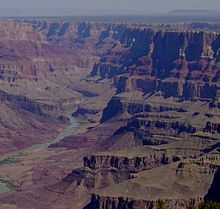
At the same time, streams flowed from highlands in central Arizona north and across what is today the western Grand Canyon, possibly feeding a larger river.[65] The mechanism by which the ancestral Lower Colorado River captured this drainage and the drainage from much of the rest of the Colorado Plateau is not known. Possible explanations include headward erosion or a broken natural dam of a lake or river.[65] Whatever the cause, the Lower Colorado probably captured the landlocked Upper Colorado somewhere west of the Kaibab Uplift.[64] The much larger drainage area and yet steeper stream gradient helped to further accelerate downcutting.
The resulting Grand Canyon of the Colorado River trends roughly east to west for 278 miles (447 km) between Lake Powell and Lake Mead.[68] In that distance, the Colorado River drops 2,000 feet (610 m) and has excavated an estimated 1,000 cubic miles (4,200 km3) of sediment to form the canyon.[69] This part of the river bisects the 9,000-foot (2,700 m)-high Kaibab Uplift[70] and passes seven plateaus (the Kaibab, Kanab, and Shivwits plateaus bound the northern part of the canyon and the Coconino bounds the southern part).[68] Each of these plateaus are bounded by north–south-trending faults and monoclines created or reactivated during the Laramide orogeny. Streams flowing into the Colorado River have since exploited these faults to excavate their own tributary canyons, such as Bright Angel Canyon.[note 4]
Volcanic activity in the western canyon

Volcanic activity started in
The longevity of the dams and their ability to hold Colorado River water in large lakes has been debated. In one hypothesis water from the Colorado River backed up behind the dams in large lakes that extended as far as
Since the demise of these dams the Colorado River has carved a maximum of about 160 feet (49 m) into the rocks of the Colorado Plateau [73]
Ongoing geology and human impact
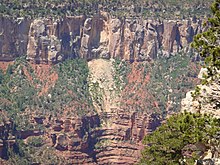
The end of the Pleistocene ice ages and the start of the Holocene began to change the area's climate from a cool, wet pluvial one to dryer semi-arid conditions similar to that of today. With less water to cut, the erosive ability of the Colorado was greatly reduced. Mass wasting processes thus began to become relatively more important than they were before. Steeper cliffs and further widening the Grand Canyon and its tributary canyon system occurred. An average of two debris flows per year reach the Colorado River from tributary canyons to form or expand rapids.[79] This type of mass wasting is the main way the smaller and steeper side canyons transport sediment but it also plays a major role in excavating the larger canyons.[79]

In 1963 Glen Canyon Dam and other dams farther upstream started to regulate the flow of the Colorado River through Grand Canyon. Pre-dam but still historic flows of the Colorado through Grand Canyon ranged from 700 to 100,000 cubic feet (20 to 2,832 m3) per second with at least one late 19th century flood of 300,000 cubic feet (8,500 m3) per second.[69] Discharge from Glen Canyon Dam exceeds 48,200 cubic feet (1,360 m3) per second only when there is danger of overtopping the dam or when the level of Lake Powell otherwise needs to be lowered.[80] An interim conservation measure since 1991 has held maximum flows at 20,000 cubic feet (570 m3) per second even though the dam's power plant can handle 13,200 cubic feet (370 m3) per second more flow.[81]
Controlling river flow by use of dams has diminished the river's ability to scour rocks by substantially reducing the amount of sediment it carries.[81] Dams on the Colorado River have also changed the character of the river water. Once both muddy and warm, the river is now clear and averages a 46 °F (8 °C) temperature year-round.[81] Experimental floods approaching the 48,200 cubic feet (1,360 m3) per second level mentioned above have been carried out in 1996 and 2004 to study the effects on sediment erosion and deposition.[82]
Grand Canyon lies on the southern end of the
Trail of Time and Yavapai Geology Museum

The Trail of Time is an outdoor geology exhibit and
The Yavapai Geology Museum include three-dimensional models, photographs, and exhibits which allow park visitors to see and understand the complicated geologic story of the area. The museum building, the historic Yavapai Observation Station (built 1928), located one mile (1.6 km) east of Market Plaza, features expansive canyon views. A bookstore offers a variety of materials about the area.[89]
See also
- Geology of the Colorado Plateau
- Grand Staircase, for regional stratigraphy
Notes and timeline

- supergroupis a sequence of vertically related groups and lone formations.
- ^ An exception is the slight effect that uplifts, upwarps and swells created by earlier phases of the Laramide orogeny have. For example, formations exposed on the South Rim are 800 feet (240 m) lower than the same formations on the North Rim because the North Rim is closer to the highest part of the Kaibab Uplift.(Foos 1999, p. 1)
- ^ Increased precipitation also allowed evergreen forests, in modern times limited to an elevation of 7,000 feet (2,100 m), to extend well into the canyon.(Price 1999, p. 42)
- ^ The Grand Canyon region gently slopes southward, so water on the North Rim flows into the canyon and water on the South Rim tends to flow away. Tributary canyons are therefore larger north of Grand Canyon and smaller south of it. Grand Canyon Village on the South Rim is located 2 miles (3.2 km) from the Colorado River and 4,460 feet (1,360 m) above it while Bright Angel Point on the North Rim is located 7.75 miles (12.47 km) from the river and is 5,940 feet (1,810 m) above it.(Chronic 2004, p. 98)
References
- ^ Harris 1997, p. 18.
- ^ a b c Kiver 1999, p. 398
- ^ a b Chronic 2004, p. 100
- ^ Beus & Morales 2003, p. 19
- ^ a b c d Price 1999, p. 23
- ^ Beus & Morales 2003, p. 24
- ^ Tufts 1998, p. 10
- ^ a b c Chronic 2004, p. 101
- ^ a b c d e f g Harris 1997, p. 22
- ^ a b c d e f g h i "There's Only One Grand Canyon" (PDF). National Park Service. Retrieved 2009-09-13.
- ^ a b Price 1999, p. 24
- ^ Harris 1997, p. 19
- ^ Beus & Morales 2003, p. 45
- ^ Beus & Morales 2003, p. 47
- ^ a b Kiver 1999, p. 400
- ^ Beus & Morales 2003, p. 55
- ^ Beus & Morales 2003, p. 56
- ^ Beus & Morales 2003, p. 75
- ^ Beus & Morales 2003, p. 61
- ^ Beus & Morales 2003, p. 63
- ^ Harris 1997, p. 11
- ^ Kiver 1999, p. 399
- ^ Beus & Morales 2003, p. 65
- ^ Price 1999, p. 28
- ^ a b Kiver 1999, p. 401
- ^ a b Karlstrom, K.E., Mohr, M.T., Schmitz, M.D., Sundberg, F.A., Rowland, S.M., Blakey, R., Foster, J.R., Crossey, L.J., Dehler, C.M. and Hagadorn, J.W., 2020. Redefining the Tonto Group of Grand Canyon and recalibrating the Cambrian time scale. Geology, 48(5), pp. 425–430.
- ^ Connors, T.B., Tweet, J.S., and Santucci, V.L., 2020. Stratigraphy of Grand Canyon National Park. In: Santucci, V.L., Tweet, J.S., ed., pp. 54–74, Grand Canyon National Park: Centennial Paleontological Resource Inventory (Non-sensitive Version) . Natural Resource Report NPS/GRCA/NRR—2020/2103. National Park Service, Fort Collins, Colorado, 603 pp.
- ^ Beus & Morales 2003, pp. 93–94
- ^ Beus & Morales 2003, p. 94
- ^ Price 1999, p. 50
- ^ "Muav Limestone". Geology of National Parks, 3D and Photographic Tours. USGS. January 20, 2015. Archived from the original on November 22, 2015. Retrieved November 24, 2015.
- ^ a b Beus & Morales 2003, p. 96
- ^ a b c d e f g h i j k l Harris 1997, p. 23
- ^ a b c d Kiver 1999, p. 402.
- ^ Price 1999, p. 29
- ^ Price 1999, p. 30
- ^ Beus & Morales 2003, p. 116
- ^ a b c Price 1999, p. 31
- ^ Beus & Morales 2003, p. 124
- ^ a b c d Price 1999, p. 32
- ^ Chronic 2004, p. 102
- ^ a b c d e f Harris 1997, p. 24
- ^ Beus & Morales 2003, p. 138
- ^ Beus & Morales 2003, p. 140
- ^ Beus & Morales 2003, p. 143
- ^ Beus & Morales 2003, p. 145
- ^ Beus & Morales 2003, p. 147
- ^ Price 1999, p. 33
- ^ Beus & Morales 2003, p. 164
- ^ Beus & Morales 2003, p. 103
- .
- ^ a b Chronic 2004, p. 103
- ^ Beus & Morales 2003, pp. 181–184
- ^ Beus & Morales 2003, p. 198
- ^ "Kaibab Limestone". Geology and Geophysics Department, University of Utah. 2010. Retrieved November 24, 2015.
- ^ a b c d Kiver 1999, p. 405
- ^ Harris 1997, p. 25
- ^ Price 1999, p. 36
- ^ a b Price 1999, p. 39
- ^ Price 1999, p. 47
- ^ a b c d e f Chronic 2004, p. 104
- ^ Beus & Morales 2003, p. 223
- 3 News. December 3, 2012. Archived from the originalon October 31, 2013. Retrieved December 2, 2012.
- ^ a b Price 1999, p. 58
- ^ a b Chronic 2004, p. 105
- ^ Harris 1997, p. 27
- ^ Kiver 1999, p. 407
- ^ a b Kiver 1999, p. 395
- ^ a b Price 1999, p. 54
- ^ Chronic 2004, p. 98
- ^ Price 1999, p. 40
- ^ Beus & Morales 2003, p. 313
- ^ .
- ^ Beus & Morales 2003, pp. 317–319
- ^ Price 1999, p. 41
- ^ a b Beus & Morales 2003, p. 321
- ^ Beus & Morales 2003, p. 324
- S2CID 53339467.
- ^ a b Price 1999, p. 57
- ^ Torresan, Laura Zink. "Grand Canyon Studies: Glen Canyon Dam". United States Geological Survey. Archived from the original on 2009-09-21. Retrieved 2009-08-30.
- ^ a b c Torresan, Laura Zink. "Effects of Glen Canyon Dam on Water in the Colorado River". United States Geological Survey. Archived from the original on 2009-05-12. Retrieved 2009-08-30.
- ^ Torresan, Laura Zink. "Controlled Flood". United States Geological Survey. Archived from the original on 2013-04-11. Retrieved 2009-08-30.
- ^ Beus & Morales 2003, p. 346
- ^ a b Beus & Morales 2003, p. 348
- ^ Beus & Morales 2003, p. 349
- ^ Beus & Morales 2003, pp. 349–350
- ^ a b Beus & Morales 2003, p. 351
- ^ "Trail of Time | The University of New Mexico". tot.unm.edu.
- ^ Yavapai Geology Museum by NPS
Bibliography
- Beus, Stanley S.; Morales, Michael, eds. (2003). Grand Canyon Geology (2nd ed.). New York; Oxford: Oxford University Press. ISBN 0-19-512299-2.
- Bronze, Black (2003). The Colorado River Super Guide Map of the Grand Canyon. Flagstaff, Arizona: Dragon Creek Publishing.
- Chronic, Halka and Lucy (2004). Pages of Stone: Geology of the Grand Canyon and Plateau Country National Parks and Monuments (2nd ed.). The Mountaineers Books. ISBN 0-89886-680-4.
- Foos, Annabelle (1999). "Geology of Grand Canyon National Park, North Rim" (PDF). Archived from the original (PDF) on 2008-10-10. Retrieved 2008-08-11.
- Harris, Ann G.; Tuttle, Esther; Tuttle, Sherwood D. (1997). Geology of National Parks (5th ed.). Iowa: Kendall/Hunt Publishing. ISBN 0-7872-5353-7.
- Kiver, Eugene P.; Harris, David V. (1999). Geology of U.S. Parklands (5th ed.). New York: John Wiley & Sons. ISBN 0-471-33218-6.
- Tufts, Lorraine Salem (1998). Secrets in The Grand Canyon, Zion and Bryce Canyon National Parks (3rd ed.). North Palm Beach, Florida: National Photographic Collections. ISBN 0-9620255-3-4.
- Powell, James Lawrence (2005). Grand Canyon: Solving Earth's Grandest Puzzle. Pi Press. ISBN 0-13-147989-X.
- Ribokas, Bob (2000). "Grand Canyon Rock Layers". Grand Canyon Explorer. Retrieved 2005-03-20.
- Price, L. Greer (1999). Geology of the Grand Canyon. Grand Canyon, Arizona: Grand Canyon Association. ISBN 0-938216-68-6.
- Rudd, Connie (1990). Grand Canyon The Continuing Story. KC Publishing, Inc. ISBN 0-88714-046-7.
External links
- U.S. National Park Service(Department of the Interior) – Grand Canyon National Park:
- Geologic timeline for the Grand Canyon at PBS.org
- Interactive Hypermedia – Correlation of the canyon's geology to a Bach fugue [Flash]
